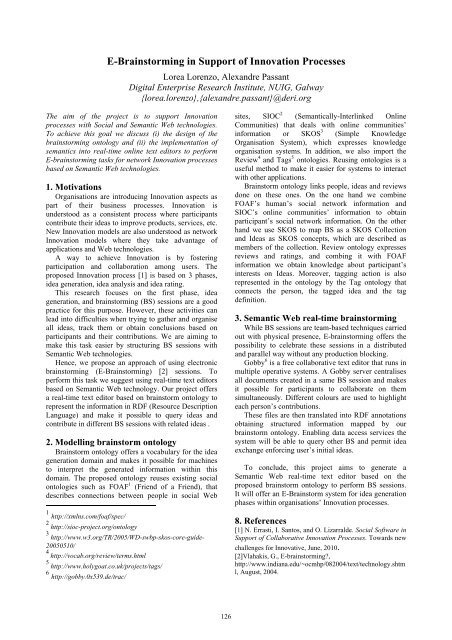NUI Galway – UL Alliance First Annual ENGINEERING AND - ARAN ...
NUI Galway – UL Alliance First Annual ENGINEERING AND - ARAN ...
NUI Galway – UL Alliance First Annual ENGINEERING AND - ARAN ...
You also want an ePaper? Increase the reach of your titles
YUMPU automatically turns print PDFs into web optimized ePapers that Google loves.
E-Brainstorming in Support of Innovation Processes<br />
Lorea Lorenzo, Alexandre Passant<br />
Digital Enterprise Research Institute, <strong>NUI</strong>G, <strong>Galway</strong><br />
{lorea.lorenzo},{alexandre.passant}@deri.org<br />
The aim of the project is to support Innovation<br />
processes with Social and Semantic Web technologies.<br />
To achieve this goal we discuss (i) the design of the<br />
brainstorming ontology and (ii) the implementation of<br />
semantics into real-time online text editors to perform<br />
E-brainstorming tasks for network Innovation processes<br />
based on Semantic Web technologies.<br />
1. Motivations<br />
Organisations are introducing Innovation aspects as<br />
part of their business processes. Innovation is<br />
understood as a consistent process where participants<br />
contribute their ideas to improve products, services, etc.<br />
New Innovation models are also understood as network<br />
Innovation models where they take advantage of<br />
applications and Web technologies.<br />
A way to achieve Innovation is by fostering<br />
participation and collaboration among users. The<br />
proposed Innovation process [1] is based on 3 phases,<br />
idea generation, idea analysis and idea rating.<br />
This research focuses on the first phase, idea<br />
generation, and brainstorming (BS) sessions are a good<br />
practice for this purpose. However, these activities can<br />
lead into difficulties when trying to gather and organise<br />
all ideas, track them or obtain conclusions based on<br />
participants and their contributions. We are aiming to<br />
make this task easier by structuring BS sessions with<br />
Semantic Web technologies.<br />
Hence, we propose an approach of using electronic<br />
brainstorming (E-Brainstorming) [2] sessions. To<br />
perform this task we suggest using real-time text editors<br />
based on Semantic Web technology. Our project offers<br />
a real-time text editor based on brainstorm ontology to<br />
represent the information in RDF (Resource Description<br />
Language) and make it possible to query ideas and<br />
contribute in different BS sessions with related ideas .<br />
2. Modelling brainstorm ontology<br />
Brainstorm ontology offers a vocabulary for the idea<br />
generation domain and makes it possible for machines<br />
to interpret the generated information within this<br />
domain. The proposed ontology reuses existing social<br />
ontologies such as FOAF 1 (Friend of a Friend), that<br />
describes connections between people in social Web<br />
1<br />
http://xmlns.com/foaf/spec/<br />
2<br />
http://sioc-project.org/ontology<br />
3<br />
http://www.w3.org/TR/2005/WD-swbp-skos-core-guide-<br />
20050510/<br />
4<br />
http://vocab.org/review/terms.html<br />
5 http://www.holygoat.co.uk/projects/tags/<br />
6 http://gobby.0x539.de/trac/<br />
126<br />
sites, SIOC 2 (Semantically-Interlinked Online<br />
Communities) that deals with online communities’<br />
information or SKOS 3 (Simple Knowledge<br />
Organisation System), which expresses knowledge<br />
organisation systems. In addition, we also import the<br />
Review 4 and Tags 5 ontologies. Reusing ontologies is a<br />
useful method to make it easier for systems to interact<br />
with other applications.<br />
Brainstorm ontology links people, ideas and reviews<br />
done on these ones. On the one hand we combine<br />
FOAF’s human’s social network information and<br />
SIOC’s online communities’ information to obtain<br />
participant’s social network information. On the other<br />
hand we use SKOS to map BS as a SKOS Collection<br />
and Ideas as SKOS concepts, which are described as<br />
members of the collection. Review ontology expresses<br />
reviews and ratings, and combing it with FOAF<br />
information we obtain knowledge about participant’s<br />
interests on Ideas. Moreover, tagging action is also<br />
represented in the ontology by the Tag ontology that<br />
connects the person, the tagged idea and the tag<br />
definition.<br />
3. Semantic Web real-time brainstorming<br />
While BS sessions are team-based techniques carried<br />
out with physical presence, E-brainstorming offers the<br />
possibility to celebrate these sessions in a distributed<br />
and parallel way without any production blocking.<br />
Gobby 6 is a free collaborative text editor that runs in<br />
multiple operative systems. A Gobby server centralises<br />
all documents created in a same BS session and makes<br />
it possible for participants to collaborate on them<br />
simultaneously. Different colours are used to highlight<br />
each person’s contributions.<br />
These files are then translated into RDF annotations<br />
obtaining structured information mapped by our<br />
brainstorm ontology. Enabling data access services the<br />
system will be able to query other BS and permit idea<br />
exchange enforcing user’s initial ideas.<br />
To conclude, this project aims to generate a<br />
Semantic Web real-time text editor based on the<br />
proposed brainstorm ontology to perform BS sessions.<br />
It will offer an E-Brainstorm system for idea generation<br />
phases within organisations’ Innovation processes.<br />
8. References<br />
[1] N. Errasti, I. Santos, and O. Lizarralde. Social Software in<br />
Support of Collaborative Innovation Processes. Towards new<br />
challenges for Innovative, June, 2010.<br />
[2]Vlahakis, G., E-brainstorming?,<br />
http://www.indiana.edu/~ocmhp/082004/text/technology.shtm<br />
l, August, 2004.
















